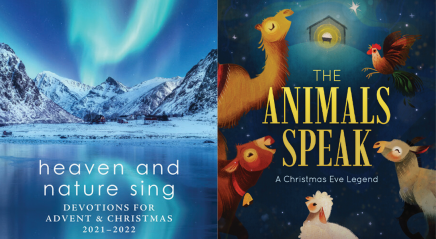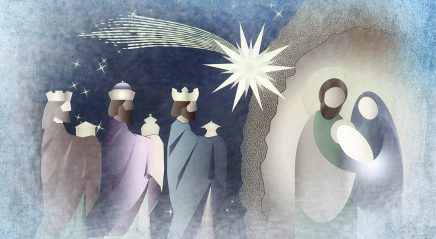Editor’s note: This piece originally ran on Jan. 6, 2022.
I have a bad habit of looking at my feet when I walk. I don’t often stub my toe or trip on uneven ground, but occasionally I run into something or someone I’m not expecting.
Our 2-year-old has the opposite issue. While we walk around our neighborhood, his head is always up and looking around. This means he often trips over his feet, but his view of the world is much broader than mine. As is the case with most toddlers, he might ask, “What’s that?” or “What’s their name?” or “What’s that called?” His curiosity reminds me that a simple shift in perspective can engender wonder.
Whether I’m looking at my feet while I walk, hunching over my cellphone or resting my elbows on a desk at work, this posture of folding inward prevents me from truly seeing the expansiveness of God’s good creation. This makes me wonder about the opportunities we miss simply because our posture doesn’t allow us to see the world around us.
Epiphany marks the day and the church season when Jesus comes to be named and understood as God’s own son, the living and breathing manifestation of God in our midst.
The Epiphany story begins with three magi noticing a new star and setting off on a journey. Arriving at their destination, these three people from distant places encounter a child born to a teenage mother in a little-known town, a birth heralded by livestock and ranchers. Jesus’ birth story isn’t what most imagine when they think of a newborn king. Yet the magi come to see and understand Jesus as God on Earth.
Most of us think of an epiphany as a flash of insight, but what if Epiphany is an invitation to notice the beauty and brilliance of what’s already there?
The name Epiphany comes from the Greek epiphaneia, meaning “manifestation.” Most of us think of an epiphany as a flash of insight, but what if Epiphany is an invitation to notice the beauty and brilliance of what’s already there?
The magi found a new star in the sky. They bore witness to the presence of God within little Jesus. And during the time after Epiphany, we’ll hear Gospel stories of Jesus growing in his understanding of who he is as God’s child and of the kind of messiah he is called to be. Perhaps, then, Epiphany is less a sudden realization and more a growth in understanding.
When I realign my focus, when I notice how much I cast my eyes to the ground or hunch over, I can lift my head, straighten my posture and enjoy a new perspective. With my eyes up, I’m free to perceive and appreciate the beautiful diversity of the people and plants and creatures I encounter. I can truly see my neighbors, noticing when someone is having a rough day. I can even serve my neighbor who’s reaching out for help.
Amid what’s been a very challenging season for many, something as simple as letting someone know you’ve noticed them can produce a profound impact. We long to be seen by each other and God.
Epiphany calls us to see our neighbors—our neighbor in need, our neighbor who’s struggling, our neighbor who puts on a brave face at worship while suffering inside, as well as our neighbor who’s rejoicing. It calls us to notice neighbors who don’t look, worship, speak, vote or pray as we do. It calls us to recognize them, too, as God’s children.
Amid what’s been a very challenging season for many, something as simple as letting someone know you’ve noticed them can produce a profound impact. We long to be seen by each other and God.
How differently might we treat one another if the first thing we noticed about someone was their identity as a beloved child of God?
When we notice and focus on what draws us together rather than what drives us apart, we can approach our differences from a place of genuine care and concern for one another’s well-being. By seeking to understand our neighbors, we can build the world God intends—a world ruled by peace, built upon equity and justice, and infused with the sweet fragrance of love.
During this time after Epiphany, let’s commit to noticing and celebrating all the ways God appears in our time and place. You might create a list and write down every time you notice God in your world—from people, plants and animals to the movements of stars and other heavenly bodies.
Take a cue from my 2-year-old: Keep your head up and look around. Maybe you’ll fill up your notebook with signs of God’s presence so quickly that you’ll need to buy another one. Notice your opportunities to bless and be blessed by others. Surely the Messiah is with us.









